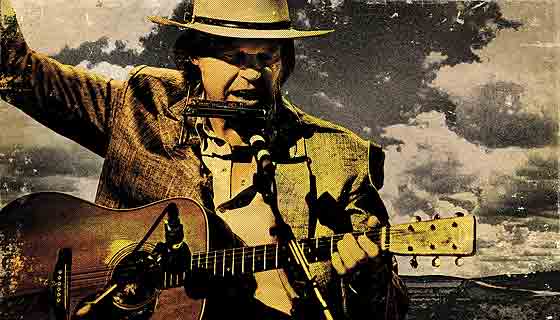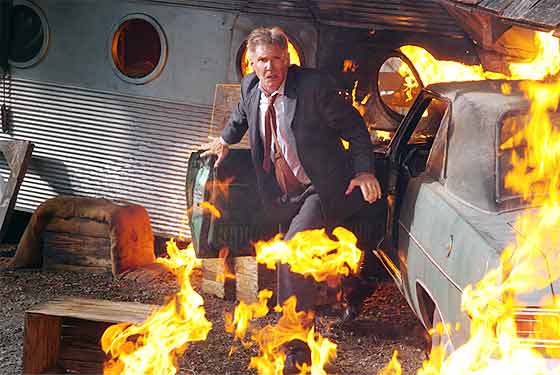
Among the achievements of Neil Young: Heart of Gold is that it triumphs over its exalted press notes, which describe it as “a groundbreaking union of film and music ministered by Jonathan Demme and Neil Young.” Ministered, huh? I’ve always preferred my country-rock with a grain of sulphur, but the Reverend Demme’s track record with concert films (chiefly that celebration of transcendental alienation Stop Making Sense) is as good as anyone’s, and the Reverend Young, bouncing back from a brain aneurysm, has certainly earned the right to take the long view. And by the time the director gets to Young and his musical family standing around tuning their instruments—it’s right before an August 2005 Nashville performance of Young’s latest album, Prairie Wind, at one of the former sites of the Grand Ole Opry—you get an inkling of the movie’s fluid grace.
In his prickly, excitable Neil Young biography, Shakey, Jimmy McDonough quotes an interview in which his subject extols the concerts of the Everly Brothers and Roy Orbison: “It’s just a quality about them, the singer is into the song and the musicians were playing with the singer and it was an entity, y’know … All these people were thinking the same thing and they’re all playing at the same time.” That’s what the movie captures. The musicians in Young’s extended family—and his immediate family, too: His wife, Pegi, sings backup vocals with Emmylou Harris and Diana DeWitt—have survived his legendary impatience and learned to get on his wavelength when they play. Demme is plainly entranced by that communion. The best moments in the film are when Ellen Kuras’s camera just sits there taking in the whole stage, the whole gorgeous ecosystem.
“If you follow every dream, you might get lost,” Young sings in “The Painter,” and that’s quite a statement in a world of rockers born to run. But the search for home is central to his songs, at least in this “Heart of Gold”–“Harvest Moon” mode. And “Prairie Wind” is an explicit stab at reconciling the lost and fleeting with That Which Endures. After 9/11, after his father’s death (preceded by dementia), he goes back to “the old farmhouse” to remember where he came from—not to wax nostalgic but to suss out what held him together while so many friends self-destructed. It’s not a soft vision. In a hotel-swamped Nashville that Hank Williams wouldn’t recognize, in a country where the past is being bulldozed, Young’s prairie dreams feel urgent: the plaints of a true conservative.
Thickened, slouched over his guitar, his white hat pulled low, this Neil Young is not the proto-punk of Crazy Horse, but the voice is as thin and beautiful in those upper registers as ever, and the young- man–old-man songs fit him even better now, in twilight. Throughout the film, he pays homage to an icon, “this old guitar” that once belonged to Williams: “It cries when I leave it alone … When I’m drunk and seein’ double, it jumps behind the wheel and steers.” He doesn’t “own” it. He’ll “keep it for a while and pass it on.”
As befits an Opry church service, Neil Young: Heart of Gold sometimes veers into kitsch: A dissonance or two might have cut through that homogenizing wash of strings. But Demme is in such perfect sync with Young’s music that even the painted prairie backdrop (and the painted farmhouse interior screen, complete with hearth, that slides in front of it) only makes you roll your eyes in retrospect. While the concert is happening, live on film, the artful plainness carries you along, and you don’t have to worry that if you close your eyes you’re going to miss 67 shots. You can listen to Young’s sweet voice singing “It’s only a dream” and dream along.

In the bearable Harrison Ford–versus–the scum thriller Firewall, Ford plays a “computer security specialist” who amazes the young geeks with his easy mastery of code, all while looking like a leathery network anchor well past his sell-by date. Long ago, Ford lost the likable springiness of Han Solo and Indiana Jones. Now he grits like Michael Douglas and rasps variations on “Don’t you touch my family!” It’s a good thing that the chief bad guy (in this case, Paul Bettany) always betters the hero’s odds by offing a couple of his own men to demonstrate his ruthlessness. Why do they always do that? And why in this one when they kidnap the hero’s family do they also bring along the yappy pooch?
The director, Richard Loncraine, doesn’t generate much tension in Firewall’s first half, in which Ford has to use his cybersavvy to move massive amounts of his bank’s money into the villains’ offshore account while his wife (Virginia Madsen, getting her first studio paycheck in years) tries to prick the consciences of flunkies one, two, and three. By the time Ford makes his 23rd attempt to escape, you’re ready to see his head blown off. The standard-issue climax (remote house, handy sharp implements) is pretty exciting, though. And the movie gets a lift from Mary Lynn Rajskub in a glamorized version of her nerd’s wet dream Chloe on 24, which is also better this year with the Chloe quotient pumped up.
Steven Soderbergh’s high-def, down-market Bubble (also available on DVD) is worth seeing, even if you’re as ambivalent about it as I am. Its strength is in the way the drama creeps up on you. At first you look at the three blue-collar characters—the overweight, glowering Martha (Debbie Doebereiner), the diffident cutie Kyle (Dustin James Ashley), and the flirty little number Rose (Misty Dawn Wilkins)—and see glum, inexpressive people in stultifying jobs in a culture that sucks the oxygen out of their brains. Very gradually, it hits you that they’re all nuts. This could either be taken as a sympathetic look at the casualties of capitalism or the condescension of a Hollywood film director for the little people. I think it’s maybe both, but haven’t decided whether the proportions are 50-50 or 60-40 or 20-80.

Steven Soderbergh’s Bubble was a guinea pig of the much-ballyhooed day-and-date distribution model. On January 27, the film was released in theaters, through on-demand cable, and on DVD (though the DVD didn’t hit most stores until January 31). So how’d it work out? Even for a star-free pic like this, opening-weekend box office was disappointing: $2,208 per screen for a total of just $70,664, according to Boxofficemojo.com (Tristram Shandy did much better, with a gross of $60,886 on only three screens). Magnolia Pictures responded that DVD orders from stores have exceeded art-film expectations. The early conclusion, Variety opined, is that “simultaneous release may be better at selling DVDs than movie tickets.”
Neil Young: Heart of Gold
Directed by Jonathan Demme. Paramount Classics. PG.
Firewall
Directed by Richard Loncraine. Warner Bros. PG-13.
Bubble
Directed by Steven Soderbergh. Magnolia Pictures. R.
E-mail: filmcritic@newyorkmag.com
